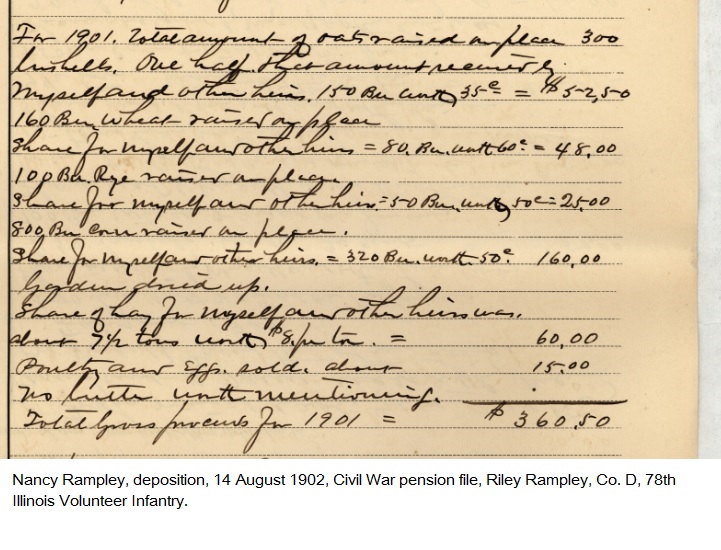Depositions in contested Civil War pension applications can provide wonderful insight into a family’s day-to-day life. This is especially true for families who do not leave behind letters or other paper ephemera.
Nancy Rampley’s application for a widow’s pension based upon her husband’s service was denied several times. The resident of Walker Township in Hancock County, Illinois, claimed the income from her late husband’s farm was insufficient to support her and the minor children he left behind when he died in 1893. Her application was denied to the point where a special examiner was sent to Breckenridge, Illinois, interview her and several others regarding her claim.
Part of the reason for her pension claim was that her income was insufficient. As a part of her deposition, Nancy made statements about her income and expenses for the time period before her deposition was made in 1902.
In 1901, Nancy indicated her proceeds from the farm included:
- 150 bushels of oats valued at 35 cents per bushel–$52.50
- 80 bushels of wheat at 60 cents per bushel–$48.00
- 50 bushels of rye at 50 cents per bushel–$25.00
- 320 bushels of corn at 50 cents per bushel–$160
- her share of the hay-7.5 tons at $8 per ton-$60.00
- poultry and eggs sold–$15.00
- garden dried up
- no butter worth mentioning

Nancy’s son farmed for her and received half the crops as his share. It is not mentioned why Nancy’s share of the 800 bushels of corn was 320 bushels instead of 400. The statement that the “garden dried up” makes me wonder if 1901 was a dry year. That’s something that may be mentioned in local newspapers.
Lessons and Reminders:
Not every Civil War pension application contains depositions of this type. Those that do will not necessarily have details regarding the applicant’s income. The content of the deposition depends upon the individual claim and the reasons for its denial. Nancy was claiming she needed the pension to supplement her income. Her claim was denied by the pension office because she considered able to work. Other widows may have had to prove their soldier’s service or their relationship to the soldier. Nancy’s claim was not denied for those reasons, so her testimony does not focus on those items.
In a future post we’ll look at Nancy’s expenses for 1901.

One response
Pension applications are an interesting read. Some are so sad that you almost cry. Then there are others such as one in which the applicant, a civil war vet who lived with his son, stated that if the pension board needed more information they had a telephone! Quite a luxury for rural area in the 1920’s. His application was approved, however.